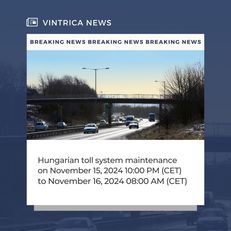Toll in Denmark: An overview of all important information
In Denmark, there is no motorway toll for passenger cars. However, tolls are charged on some bridges. Nevertheless, road trips through the country can be a great opportunity to discover the breathtaking natural scenery and charming cities. Particularly, the island of Zealand, home to the capital Copenhagen, is a great starting point for numerous exciting trips.
Toll roads
In Denmark, tolls on motorways are only charged for lorries with a permissible total weight exceeding 12 tonnes. There is no dedicated toll regulation for cars. However, this does not mean that all Danish roads can be used free of charge. Due to their role as a crucial traffic hub, toll fees are levied for crossing certain bridges on the island of Zealand in the Baltic Sea.
Toll-charged bridges in Denmark
These include the Crown Princess Mary’s Bridge over the Roskilde Fjord, the Storebælt Bridge over the Great Belt and the Øresund Bridge, a bridge-tunnel combination between Copenhagen and Malmö (Sweden). The fees at these bridges apply to both Danish and foreign drivers, including those from Sweden traveling in Denmark. It's important to note that the charges are calculated for a one-way journey, so usage fees may apply again on the return trip.
Crown Princess Mary’s Bridge
| Vehicle Type | Price in Danish Kroner | Price in GBP |
|---|---|---|
| Motorcycle | Exempt from toll | Exempt from toll |
| up to 3.5t | 14 DKK | 1.62 £ |
| Campervan up to 6m | 14 DKK (under 5.5t) 41 DKK (over 3.5t) |
1.62 £ 4.75 £ |
| Campervan 6 - 10m | 41 DKK | 4.75 £ |
| Campervan over 10m | 41 DKK | 4.75 £ |
Storebælt Bridge
| Vehicle Type | Price in Danish Kroner | Price in GBP |
|---|---|---|
| Motorcycle | 145 DKK | 16.60 £ |
| up to 3.5t | 275 DKK | 31.49 £ |
| Campervan up to 6m | 275 DKK | 31.49 £ |
| Campervan 6 - 10m | 620 DKK | 70.99 £ |
| Campervan over 10m | 960 DKK | 111.26 £ |
Øresund Bridge
| Vehicle Type | Price in Danish Kroner | Price in GBP |
|---|---|---|
| Motorcycle | 230 DKK | 26.34 £ |
| up to 3.5t | 455 DKK | 52.10 £ |
| Campervan up to 6m | 455 DKK | 52.10 £ |
| Campervan 6 - 10m | 910 DKK | 104.20 £ |
| Campervan over 10m | 1.600 DKK | 183.20 £ |
The listed prices for the bridge are as of 2024. Please note that prices may change at any time. For further information and updated prices, we recommend visiting the official websites of the Storebælt Bridge and Øresund Bridge.
City toll in Denmark
At present, Denmark does not have a city toll, i.e. a fee for entering specific urban areas. However, there are discussions as to whether such a toll should be introduced in Copenhagen in the future to reduce traffic in the city centre. In contrast, Sweden and Norway have already implemented a city toll to regulate traffic in certain areas of their cities and to reduce environmental impact.
Toll charges and payment
Toll charges
The fee for the Danish toll varies depending on the type of vehicle and the distance travelled. The toll can be paid either directly at the toll booth or through an automatic payment system. Especially convenient: Most toll booths accept both Euros and Swedish Kronor as payment.
Lorry toll payment
The lorry toll provides various payment options. One option is to pay the fee at the toll booth using a credit card or cash. Another option is to purchase an online ticket, which remains valid for 30 days and allows for a refund within a 14-day period. The latter is applicable for the Øresund Bridge but not for the Storebælt Bridge. The third option is to purchase an annual subscription called BroPas for approximately £ 37.22. This includes the BroBizz transponder, which is attached to the windshield. When passing through a toll station, the amount is automatically debited. Depending on the payment method, you need to use the yellow, blue, or green lane. Yellow and blue lanes are for cash or credit card payments only, while the green lane allows for automatic toll payment through an online ticket or the BroBizz transponder.
Bridge toll payment
On the Crown Princess Mary’s Bridge, the vehicle's licence plate is recorded, and the invoice is sent by post. Alternatively, you can use electronic payment options such as AutoPass from Norway or Bizz from Brobizz A/S. The Storebælt Bridge offers different lanes for cash payers, card payers, and users of a transponder such as AutoPass. For the Øresund Bridge, payment can be made in cash, by credit card, or online.
Does Denmark have a vignette?
Toll regulations for lorries
In Denmark, there is no traditional vignette for toll payment. Instead, lorries with a permissible total weight of over 12 tonnes can utilize the electronic Eurovignette system. The Eurovignette is valid in all European countries within the Eurovignette system, including Luxembourg, the Netherlands, and Sweden. The purchase of a single Eurovignette allows for passage through all countries.
Toll regulations for cars
Car drivers pay tolls using a distance-based toll system. Instead of using a sticker or registering the vehicle for a specific period, a fee is charged for each journey on the roads. Generally, tolls in Denmark are not applicable for road usage but specifically for crossing certain bridges.
How are tolls controlled in Denmark?
The toll in Denmark is monitored at various locations, including border crossings from the Swedish side. For surveillance, primarily cameras and automatic licence plate recognition systems are used. The cameras are mostly located at toll booths and bridges. The fee is then either debited from a pre-registered payment method, or the driver receives an invoice by post. Mobile controls can also be conducted on the road.
Fines
It is hardly possible to bypass the tolls in Denmark, as either the vehicle licence plate is automatically recorded, or a gate must be passed. Those attempting to pass Danish toll booths without payment can expect not only the due toll fees but also a fine of 600 DKK, equivalent to approximately £ 70.
Who is exempt from a vignette?
In Denmark, various vehicles are exempt from tolls. These include:
- Electric vehicles, as they are considered environmentally friendly
- Vehicles used by individuals with a disability permit
- Vehicles used by the emergency services, fire brigade and police
- Agricultural vehicles operating on designated roads and paths
Tolls in neighbouring countries
The following neighbouring countries of Denmark also have compulsory tolls to finance and maintain their motorways:








 Germany
Germany Norway
Norway Sweden
Sweden